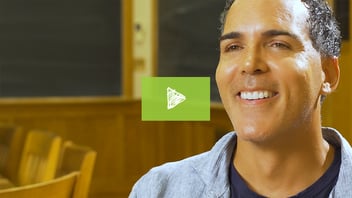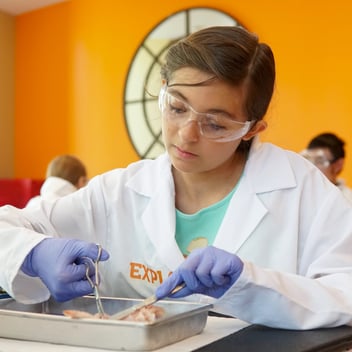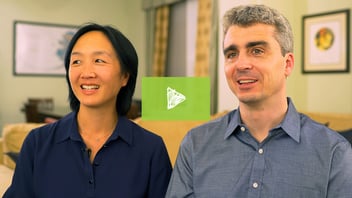Delaware-area Summer Camps Thrive Under Expert Guidance From Industry Leader
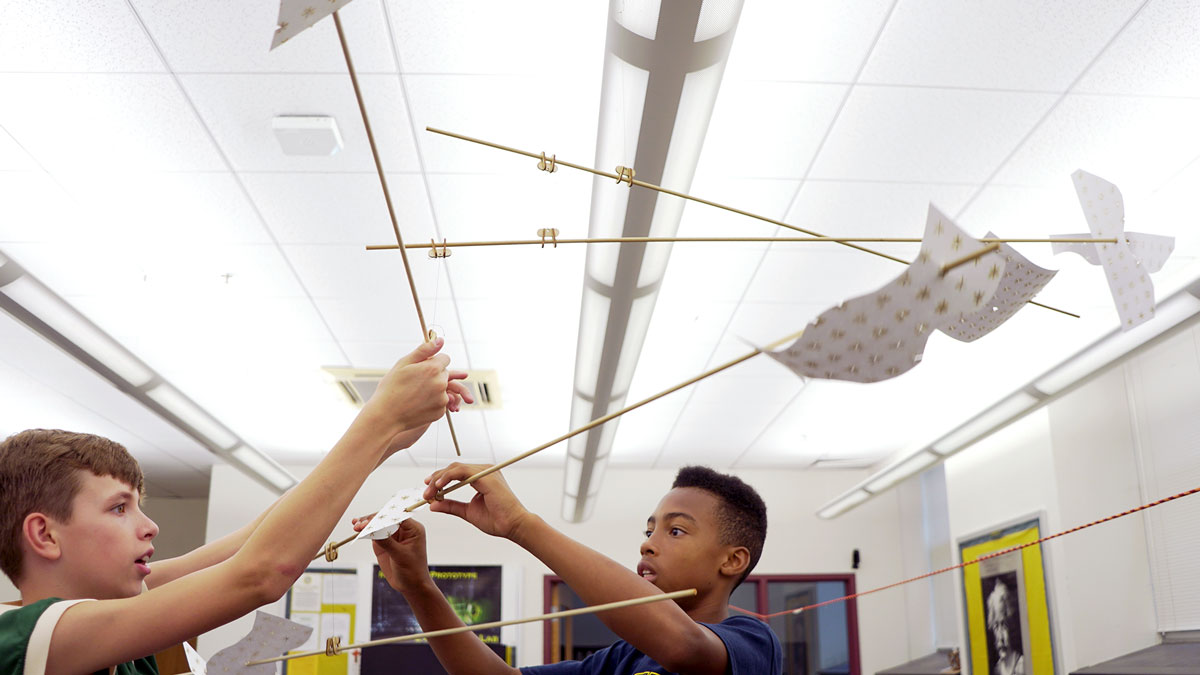
In November 2014, summer camp administrators from five urban camps in Wilmington, Delaware entered the Exploration Center — EXPLO’s headquarters in Massachusetts — for three days of intensive professional development to learn EXPLO’s methods. If EXPLO was the best in the game, could they take that secret ingredient and apply it to their own programs at home to build better summer programs for their kids?
It could have been a scene from Willy Wonka. The EXPLO warehouse — with its maker labs, video production studio, and endless materials — was worlds away from what they knew.
“I thought, ‘What is this? They build hovercrafts?’” says Matthew Johnson, camp director at the Hilltop Lutheran Neighborhood Center. Most of his campers lived at or below the poverty level.
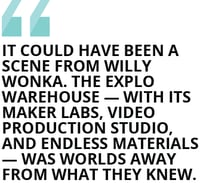 Johnson and the other administrators came to EXPLO as part of SummerCollab — at the time a brand-new consortium to help community summer camps in Delaware stanch learning loss among low-income kids. The situation was dire: Kids were losing three months of learning on average over the summers.
Johnson and the other administrators came to EXPLO as part of SummerCollab — at the time a brand-new consortium to help community summer camps in Delaware stanch learning loss among low-income kids. The situation was dire: Kids were losing three months of learning on average over the summers.
The problem was not any lack of dedication on the part of the camp directors.
“These people who work as heads of youth programs in low-income neighborhoods are truly heroes,” says Catherine Lindroth, founder and president of SummerCollab. “These are people who are really smart and dedicated, and who need all the resources they can get. When it comes to education, they don’t ever get a seat at the table. But there’s an enormous weight of community civilization that’s sitting on their shoulders.”
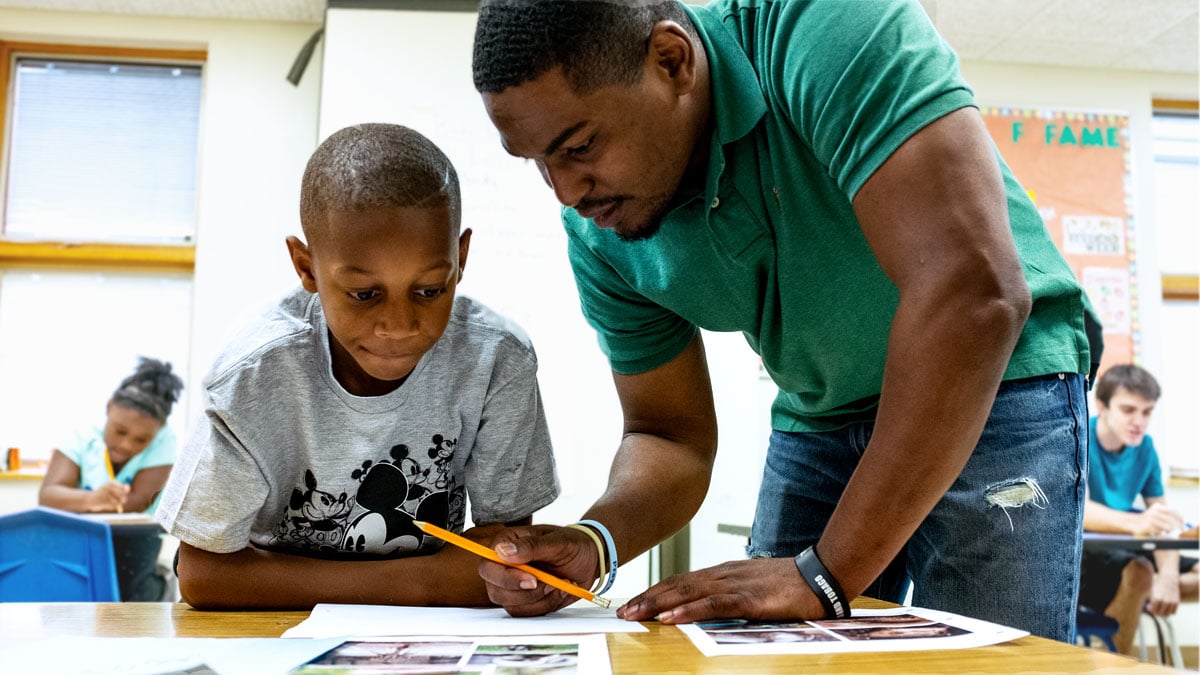
Compounded year after year, their campers’ learning loss left some as many as five grades behind their peers. And the prospect of reversing that trend began to look ever more hopeless.
So what could they do? How could these camps make the leap from day-to-day survival to the kind of success that reverberates over a lifespan?
Calling in the Experts
This was more or less the question that Lindroth posed to EXPLO President Moira Kelly earlier that year. At the time, Lindroth was a 24-year-old Teach for America operations specialist collaborating with community organizations in Wilmington to better understand and meet their needs. She had a grant from Barclays; a community mandate to make change; and the audacity to pick up the phone and make a cold call to the director of an organization she considered a national model of summer excellence.

Kelly heard her out, and she believed the transformation they sought was achievable. She offered EXPLO’s expertise on one condition:
“If the way you’re going to measure success is through English and math scores, then we’re probably not the people you want to hire. But if you want to get kids excited about learning, we can help. And it may well result in those scores going up.”
That summer, Kelly visited several of the camps. She saw well-intentioned lessons go awry and staff exhausting precious energy prodding kids into single-file lines. As Kristina Woznicki, camp director at the YMCA of Delaware, told Kelly: “Behavior management is a significant issue all the time. Our focus is keeping kids safe in the most fundamental way.”
In an environment like that, how could learning stand a chance? To Kelly’s eye, the problem wasn’t curriculum, but culture. She wanted to bring the directors to EXPLO to immerse them in new ideas of what was possible.
Delight Clouded by Doubt
For those three days in November 2014, camp administrators attended the equivalent of space camp for educators. They were freed from the gravity of overwork and understaffing and able to “dream big about how they want to operate for their kids in an ideal state,” Lindroth says. “These extraordinarily brilliant EXPLO leaders poured out all of their knowledge and all of their wisdom.”
Through case studies, individual consulting, and hands-on exercises, EXPLO staff encouraged camp administrators to re-imagine their camps from every angle:

The possibilities were tantalizing, but for many of the camp leaders, the dazzle was tinged with discouragement.
“This is what rich people in New England do,” thought one participant. Matthew Johnson found some of the ideas as fantastical as the hovercraft: “How are we going to afford these things? Do my kids have the capacity to make this happen?"
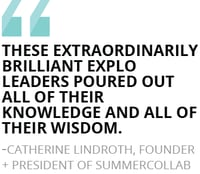 And then came the most challenging notion of all: Camper choice. Kelly insisted that camps could not teach good citizenship by demanding compliance from their campers; they would have to give kids opportunities to make decisions for themselves.
And then came the most challenging notion of all: Camper choice. Kelly insisted that camps could not teach good citizenship by demanding compliance from their campers; they would have to give kids opportunities to make decisions for themselves.
Kristina Woznicki remembers it as a thunderclap moment. “I was sitting with my team and [my colleague] was looking at me like, ‘You’re crazy. We’re not going to do this,’” she says. “It was scary, but at the same time, exciting.”
Accountability, Capacity, Follow-through
The camp leaders left the EXPLO retreat minds ablaze with new ideas, but facing a bumpy re-entry into the world they operated in. They would have to apply what they learned at community centers that primarily aspired to be oases of safety in a city with a violent crime rate quadruple the national average.
SummerCollab was there to step in and help with the logistics.
“We said, ‘What pieces of this do we all agree to?’ Then we wrote a contract with the camps,” Lindroth says. “We would say, ‘Okay, we’re going to fund those roles and technology. And we will hold each other accountable to take those strides together.”
In that first year, with so many patchwork organizational systems to demolish and create afresh, SummerCollab didn’t immediately sweat student outcomes. Instead, they made a rubric for camps’ operational progress and focused foremost on that. The idea was simple: You can’t expect functional, healthy learning from kids until you have a functional, healthy camp to work within. Along the way, EXPLO offered a steady stream of feedback – Kelly advised Lindroth on a monthly basis while EXPLO staff came to Delaware for trainings, consultations, and site visits.
“EXPLO inspired our partners to new heights,” Lindroth says of the collaboration. “SummerCollab provided the accountability and capacity and follow-through.”
Not Your Same Old Summer Camp
When EXPLO told camps they needed to start hiring staff far earlier than their usual May or June, the camps switched gears to hire in January instead — and SummerCollab was there to organize a 3-hour recruitment event where camps could interview as many as 50 candidates.
Over the years, the camps kept refining what worked. Matthew Johnson’s camp overhauled its planning process so that preparation happened all year long, rather than in the two months before the summer began.
Johnson found that, given his camp’s tight resources, some of EXPLO’s ideas had to be scaled down, or lessons adapted — but that didn’t render them inoperable. The challenge was not unlike one of EXPLO’s lesson plans, requiring kids to pull off feats of design and imagination out of nothing but cardboard. The key was to be creative with limitations, rather than defeated by them.
That thinking has ignited Johnson’s campers, as well. Now, the kids at the Hilltop camp are literally knocking down walls — with catapults they’ve designed and built themselves.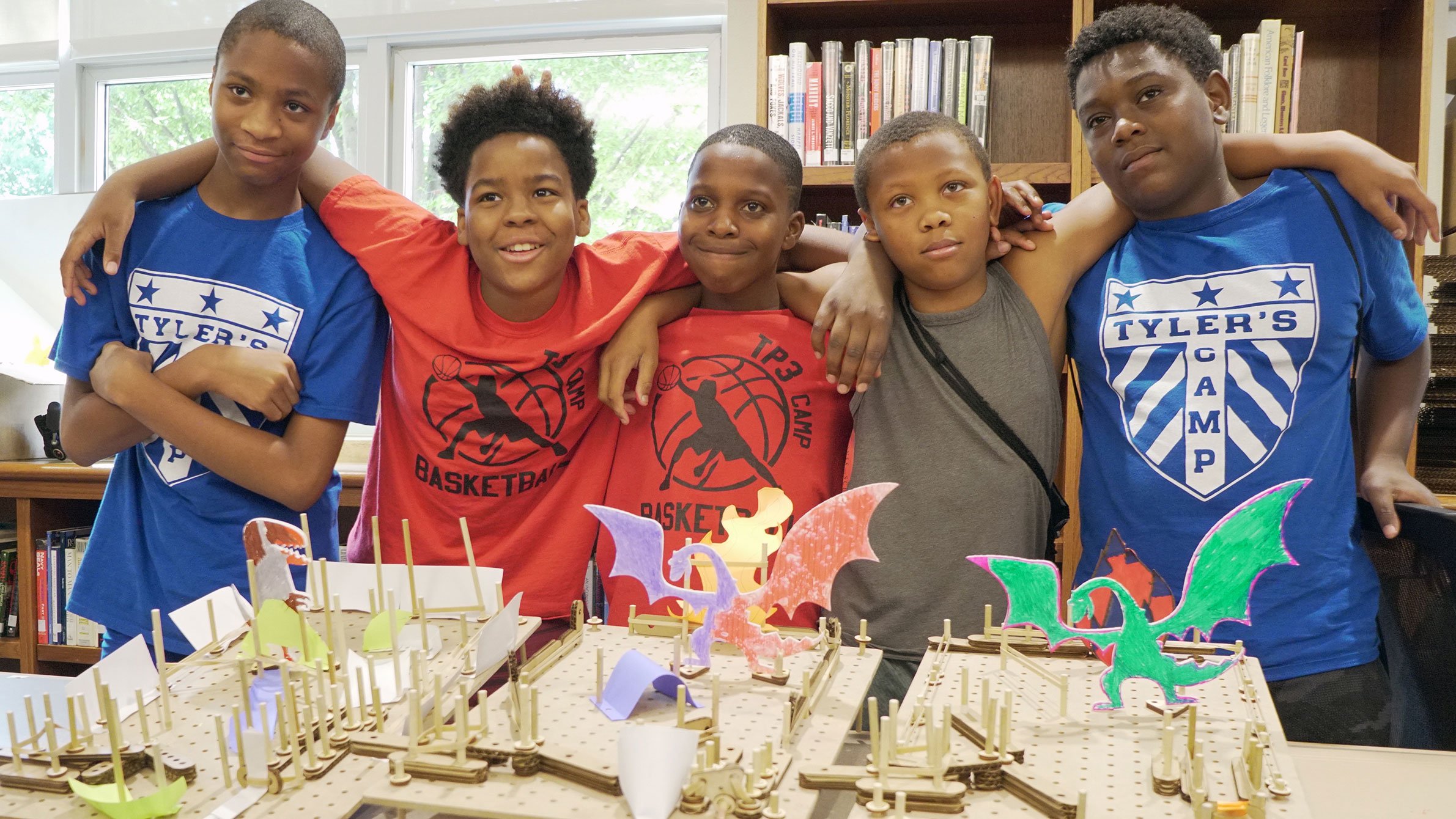
“It’s not the same old summer camp anymore,” Johnson says. “Every year is a growth process. As we move forward, we try to make sure that expectations grow.”
Choice: A Key Ingredient
At the YMCA of Delaware, Kristina Woznicki took a bold stance with her staff: That first winter, she chucked every old way of doing things out the window. Together, they would start anew. Every aspect of camp organization was up for discussion, and suddenly, people started sprouting ideas. “They were able to say, ‘I never did like this or that. How can it be done better?’” she says.
And despite initial resistance from some colleagues, she started granting campers greater choice in their activities.
“For example, you might think everybody loves swimming. But that’s not so true. Not if you’re a middle school girl with a new hairdo,” she says. “So you get kids sitting on the pool deck in the heat and they’re miserable. Those are the kids who will be causing a disruption.”
Now, the camp offers a menu of choices within different categories of activities. The benefits have cascaded throughout the camp — kids who used to act out are better behaved, the other kids who suffered from their disruptions can now freely participate, and the counselors are able to teach what they’re passionate about to campers who want to be there.
“Camper choice is now the one thing in our camp that we would never take away, because the behavior is so much better,” Woznicki says. “It’s still logistically difficult, but we realized how few choices our kids normally get in their lives. They need that practice.”
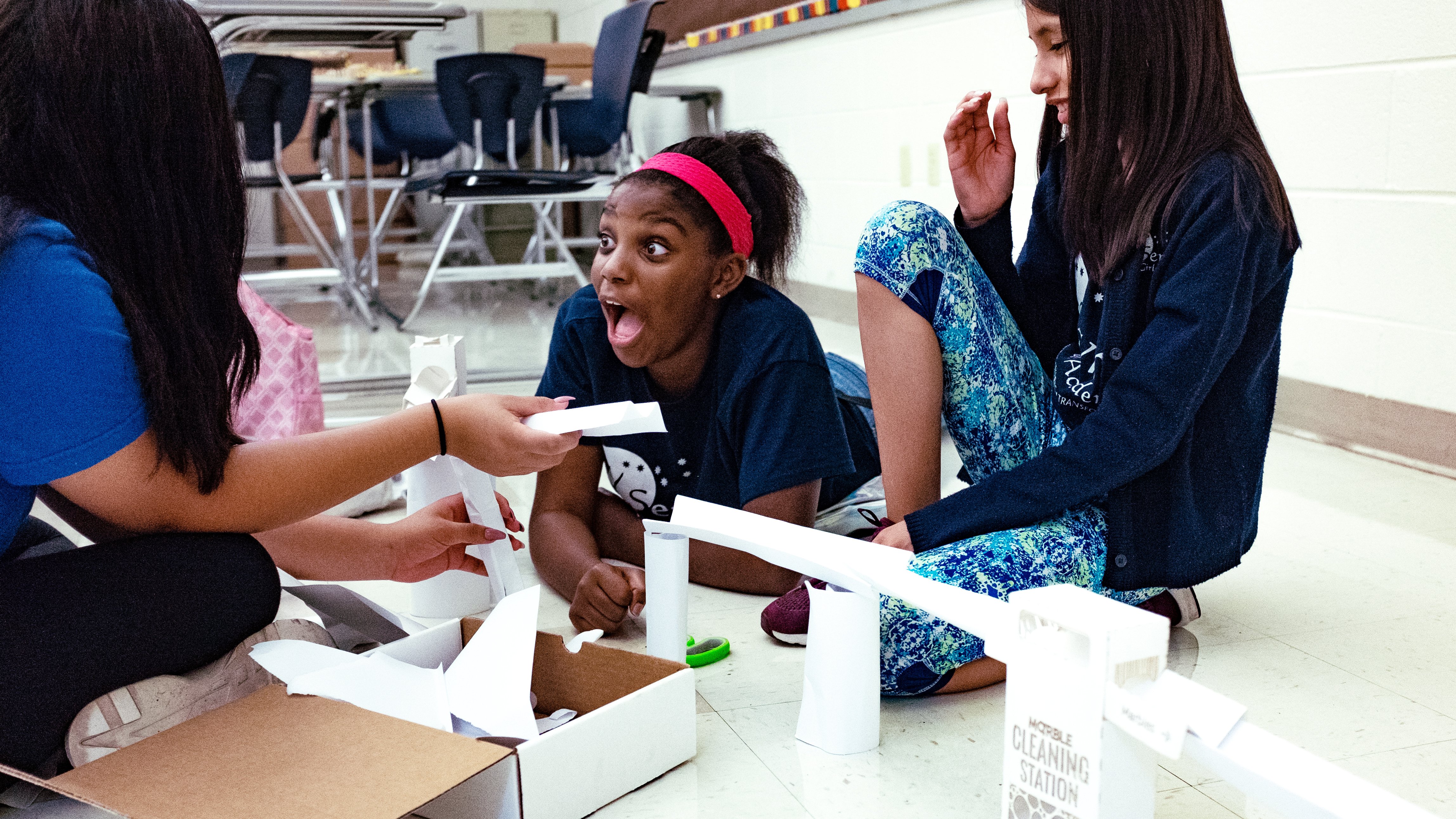
A Surprise MVP: The Daily Schedule
To make these choices possible, Woznicki’s team had to revamp the camp’s scheduling system. Originally, the entire schedule fit on one piece of paper, which dictated that kids assigned to a particular block would follow a pre-arranged schedule of activities.
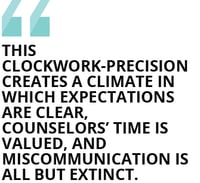 Now, Woznicki has a master spreadsheet that can be used to generate customized schedules for each counselor. Any tweak to the master schedule re-populates in the individual ones. And these schedules contain every grain of information a counselor needs — from rooms to transition times to lesson plans to cleaning instructions. This clockwork-precision creates a climate in which expectations are clear, counselors’ time is valued, and miscommunication is all but extinct.
Now, Woznicki has a master spreadsheet that can be used to generate customized schedules for each counselor. Any tweak to the master schedule re-populates in the individual ones. And these schedules contain every grain of information a counselor needs — from rooms to transition times to lesson plans to cleaning instructions. This clockwork-precision creates a climate in which expectations are clear, counselors’ time is valued, and miscommunication is all but extinct.
Into this finely tuned system is input camper choice. After experimenting with a number of different approaches, the camp now uses a digital survey tool that inputs directly to the spreadsheets. Counselors can collect campers’ activity choices on their cell phones and within 20 minutes, have printed rosters of their campers for each activity.
These new efficiencies have sparked a surprising domino effect: “What we learned at EXPLO has overflowed outside our camp to the rest of the building,” Woznicki says.
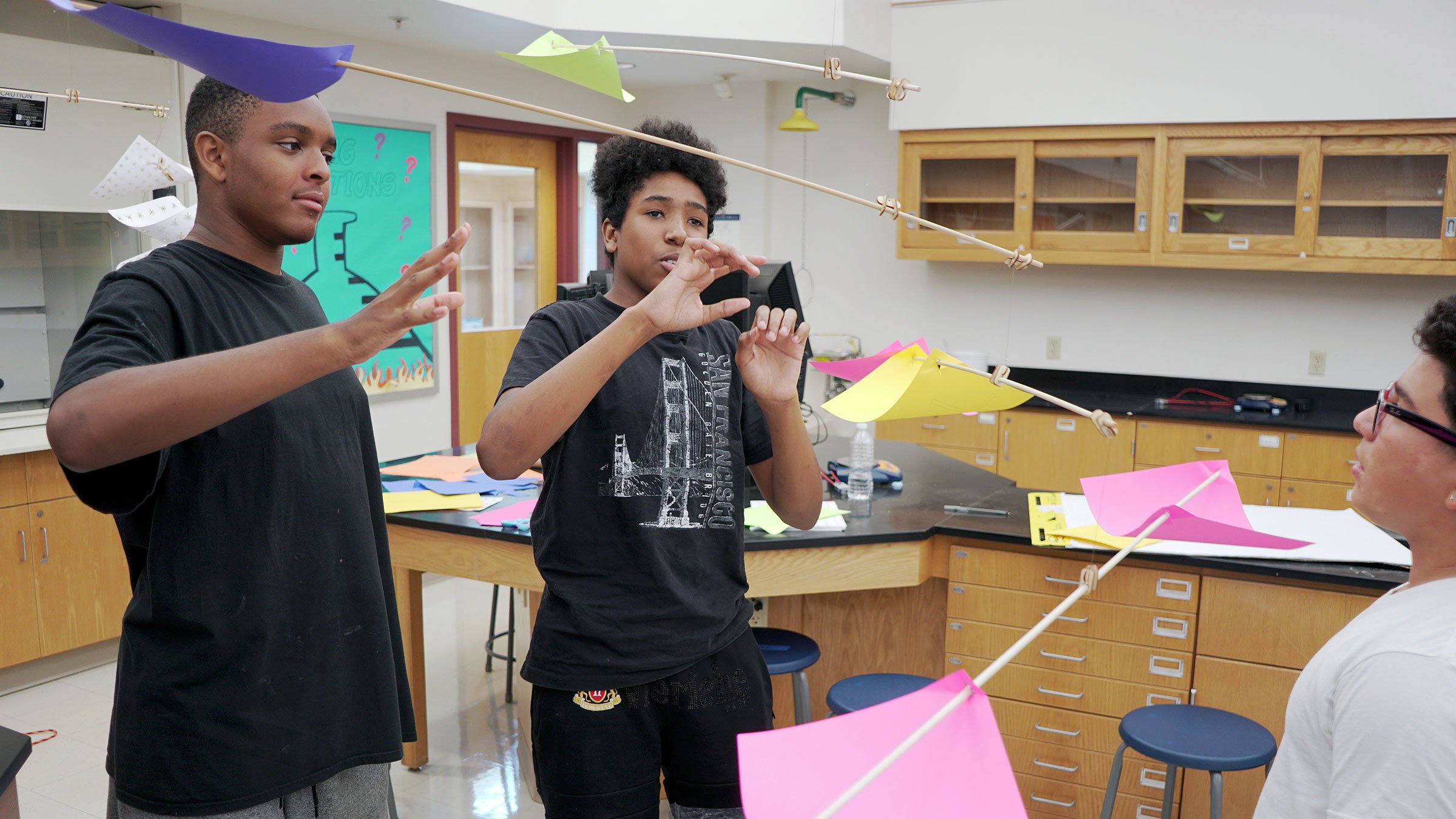
The YMCA’s teen program has also grown as cohorts of students graduating from the summer camp are motivated to stay involved with the organization’s programming. Some have even returned as camp staff.
Camps — and Culture — Transformed
Meanwhile, SummerCollab’s success has not escaped the notice of major funders — including the Longwood Foundation, Capital One, and WSFS — who have helped scale its efforts.

Since collaborating with EXPLO, SummerCollab has grown from a $125,000 per year organization that partnered with five camps to one with an annual budget of $1.3 million and 19 affiliated community centers. Their founding vision is no longer in their mind’s eye, but plain to see in countless Delaware communities: students at SummerCollab camps now gain 3.7 months of learning on average over the summers.
As exciting as that outcome may be, Lindroth and Kelly insist it should not be surprising. Despite their many challenges, the SummerCollab camps always had one natural resource in abundance: the curiosity, the energy, and the resilience of their kids.
“EXPLO believes that kids should be doing things that are incredible, amazing, and challenging,” Lindroth says. “That means we have to be flexible in our thinking, too. Step away from what we’re used to. Default to yes.”

This radical cultural mindshift, Kelly says, is the key to organizational change.
“If you have a north star of where you want to go, you may need to zig and zag, but you can get there,” Kelly says. “If you start from the premise of ‘I can’t get there,’ then you never will.”

